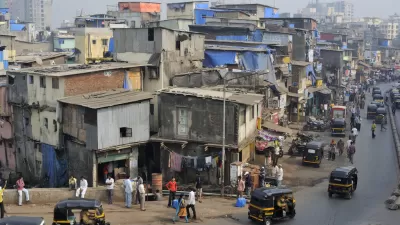Worldwide media coverage earlier this week of Tata Motors unveiling their Nano car-for-the-masses brings the argument over individual car ownership to the forefront yet again. Thanks to one hundred or so years of clever marketing, our society glorifies the bling of a shiny new car, demands auto ownership as a basic right, and proclaims its necessity to be (almost) as critical as water, food, and shelter.
Worldwide media coverage earlier this week of Tata Motors unveiling their Nano car-for-the-masses brings the argument over individual car ownership to the forefront yet again. Thanks to one hundred or so years of clever marketing, our society glorifies the bling of a shiny new car, demands auto ownership as a basic right, and proclaims its necessity to be (almost) as critical as water, food, and shelter. Anyone in doubt of this is advised to read Mike Davis' City of Quartz for a taste of 20th Century capitalist reality. Alternative transportation activists struggle to argue against these beliefs, often finding themselves on the opposite side of the debate from the very governments and citizens they are hoping to help, because after a century of development geared towards the car, it's hard to tell people who have no other option but to drive that they should give up their only form of mobility. In developing countries where driving is less prolific, the car is seen as a symbol of eschewing poverty and the drudgery of antiquated transit systems and walking/biking arduous distances. How do we get out of this mess?
For starters, there is and always will be a smart place in our society for the automobile. It's the family weekend trip to the mountains or beach, it's the transport of instruments/equipment for a bar gig, it's the way to get flat-pack furniture home from Ikea. Cars are and always will also be a symbol of wealth and stature, simply due to the amount of raw materials and cost required to build and own one. All that said, the recent debate around the Tata Nano, a city-sized four-seater (10 foot by 5 foot) poised to "revolutionize transport", amongst environmental activists on one side, and car manufacturers and enthusiasts on the other, is a sad, stark illustration of how contorted our view is of the automobile's importance.

Rather than a solution to the woes of urbanites fed up with poorly funded/operated transit, the car is but one choice in the large basket of modal options that can be integrated with our cities. If other options aren't working well, then the problem is to fix those, not supplant them with a car for everyone. In developed cities where cars are treated on par with buses, trains, and bicycle and pedestrian facilities, each receives its fair share of funding, offering practical choices and alternatives to owning and driving a car. Somehow, we must clearly communicate to the world (louder than the car commercials) that the experiment in certain countries to forfeit other modes for the car was, in truth, a mistake. We, the developed, modernized, high-tech, wealthy world leaders, live with congestion in the form of clogged highways and streets, outrageously high accident-related fatalities (much higher than any disease, or most combined), enormous amounts of air pollution and end-of-product-cycle waste, and limited accessibility to our less wealthy citizens. Add to this the unquantifiable societal effects of carting oneself around in a metal box with limited contact to our neighbors and the cool, sleek, liberating tilt of your typical car advert starts to lose its glimmer. But since this coming-to-terms hasn't occurred en masse in our own countries, what gives us the right to tell others, such as the current debate in India, that they shouldn't follow in our footsteps?
I think the reality is that there's a bit of crossing of paths. Many western countries are slowly but surely returning to a more diverse mix of modal options present before the car took center stage. Even in the U.S., many cities are making a push for more equitable use of public space (a.k.a. city streets), shifting cars from the forefront to a sharing partner in the modal choice bag. While this is happening, countries such as China and India are bursting at the seams with newly wealthy (in relative terms) citizenry looking to seize the purported dream of owning a car and forgoing those stinky old buses. I think that those of us who honestly practice what we preach not only can, but have an ethical obligation to, make the case for a better mix of modes in urban contexts whenever and wherever the opportunity comes up.
In this transitional period, there will be opportunities lost. But there are also chances to make great advances. For one, cities that are facing the threat of a private auto onslaught can focus heavily on replacing their outdated transit fleets with clean, comfortable, appealing vehicles that make public transport a fair contender; compare a city bus in Helsinki to one in Lima, for example. Next, look to land use policies in developed nations that include a respectable place for cars amongst the span of modal choices as precedents for smart development, rather than the worn, auto-centric models that are currently on the mend. Finally, take advantage of the mistakes made in transportation policy by so-called modernized nations as a place to "leapfrog" past the errors straight into best practice without wasting money on the cost of poorly planned infrastructure.
With these, and many other, incremental steps, younger nations just getting their balance can offer their citizens safer streets, cleaner air, and saner minds with little or no pay-back period. At the same time, other countries recovering from the economic and social wounds of a car culture can gradually remove their bandages with a healthy lesson learned.

Trump Administration Could Effectively End Housing Voucher Program
Federal officials are eyeing major cuts to the Section 8 program that helps millions of low-income households pay rent.

Planetizen Federal Action Tracker
A weekly monitor of how Trump’s orders and actions are impacting planners and planning in America.

The 120 Year Old Tiny Home Villages That Sheltered San Francisco’s Earthquake Refugees
More than a century ago, San Francisco mobilized to house thousands of residents displaced by the 1906 earthquake. Could their strategy offer a model for the present?

Alabama School Forestry Initiative Brings Trees to Schoolyards
Trees can improve physical and mental health for students and commnity members.

NYC Outdoor Dining Could Get a Re-Do
The city council is considering making the al fresco dining program year-round to address cost concerns from small businesses.

HSR Reaches Key Settlement in Northern California City
The state’s high-speed rail authority reached an agreement with Millbrae, a key city on the train’s proposed route to San Francisco.
Urban Design for Planners 1: Software Tools
This six-course series explores essential urban design concepts using open source software and equips planners with the tools they need to participate fully in the urban design process.
Planning for Universal Design
Learn the tools for implementing Universal Design in planning regulations.
Ada County Highway District
Clanton & Associates, Inc.
Jessamine County Fiscal Court
Institute for Housing and Urban Development Studies (IHS)
City of Grandview
Harvard GSD Executive Education
Toledo-Lucas County Plan Commissions
Salt Lake City
NYU Wagner Graduate School of Public Service






























